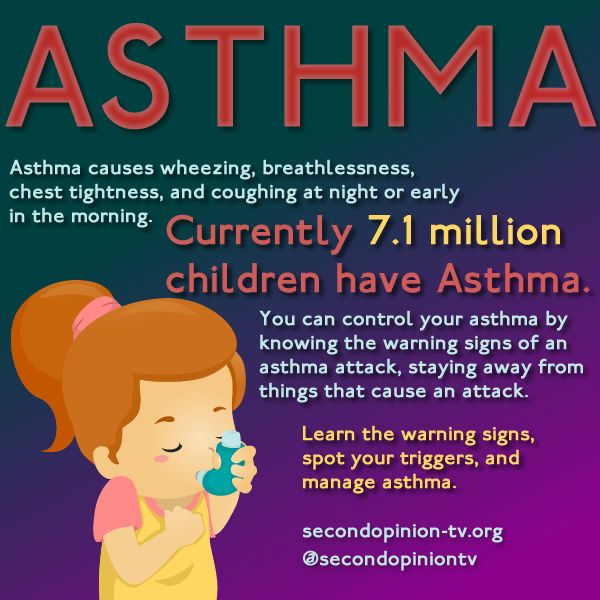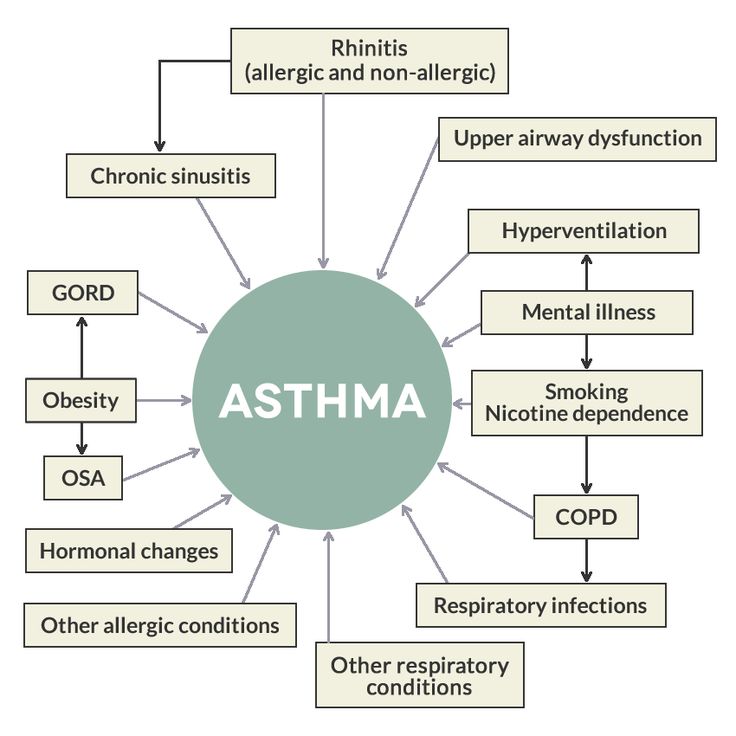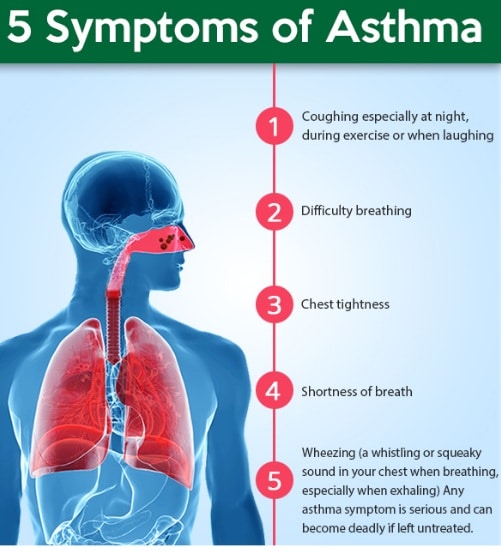What Is Severe Persistent Asthma
People with severe persistent asthma have asthma symptoms every day, throughout the day. As a result, your daily activities are extremely limited. You might wake up every night because of your asthma symptoms. You must use rescue medicines several times a day. Your lung spirometry tests will show severely decreased lung function.1
If you have severe asthma, you may need to see a team of specialists in addition to your regular asthma doctor. You might also seek mental health support for asthma, such as seeing a therapist or joining a support group for people with asthma.2
What Are The Asthma Signs And Symptoms
Signs of an asthma attack include:
Mild or moderate
- Minor difficulty breathing with short, shallow, rapid breaths
- Chest retractions
- A whistling sound when you breathe, especially out
- Able to talk in full sentences
- May experience a dry cough that wont go away
Mild anxiety attacks may last only a few minutes. These attacks can resolve spontaneously or may require medication, typically an asthma inhaler.
What to do: Start asthma first aid
Severe
Severe asthma symptoms need medical care right away.
- Feeling panicky
- Cannot speak a full sentence in one breath
- Having trouble talking or walking
- Getting tight neck and chest muscles
A severe episode can last from hours to days.
What to do: Call an ambulance and start asthma first aid
Life-threatening
- Ribs or stomach moving in and out deeply and swiftly
- An expanded chest that does not deflate when you exhale
- Not responding to reliever medication
What to do: Call an ambulance and start asthma first aid
How long your asthma attack lasts can vary, depending on the cause and inflammation in the airways.
What Is Status Asthmaticus
Status asthmaticus is respiratory failure that comes with the worst form of acute severe asthma, or an asthma attack. If an attack comes on quickly and it doesnât respond to regular treatment, it can lead to status asthmaticus, If it happens, you may have to go to the hospital to get it treated. If you have a bad asthma attack and your rescue inhaler or your nebulizer doesn’t help, you need medical care right away.
If you have a steroid medicine at home , you can take a dose of it on your way to the emergency room.
Many people have asthma. And there are many treatments to manage it. Itâs important to follow the asthma action plan that you made with your doctor, avoid your triggers, take your medicine, and keep up with your doctor appointments.
Still, asthma attacks can happen, and some severe ones are an emergency.
With any asthma attack, never wait to see if it goes away on its own. It could worsen so much that you need to go to a hospital.
You may hear a severe asthma attack called a âsevere asthma exacerbation.â In its most severe form, you may hear it called status asthmaticus.
Don’t Miss: Can You Die From Exercise Induced Asthma
Copd And Aging: Everything You Need To Know
Chronic obstructive pulmonary disease is one of the most prevalent lung conditions, affecting more than 328 million people around the world and an estimated 16 million people in the United States alone.
Despite how common COPD is, its often overshadowed by other chronic illnesses like lung cancer, heart disease, and diabetes. A report published by the EMBO Journal found that, while COPD results in about 300,000 deaths per year nearly double that of lung cancer it received less than a third of the funding.
While the inequity in COPD research funding can only be addressed through political and social advocacy, healthy lifestyle choices remain the best way to prevent and treat COPD. And in order to make healthy lifestyle choices, you need to stay educated about how your lungs work. There are a lot of things to consider depending on what stage of your life youre in and whether or not youve already been diagnosed with COPD.
In this post, were going to address some key facts about aging and how it affects the prognosis of people with COPD and those who are at risk of contracting COPD. In the meantime, if you are interested in getting tested for COPD, be sure to consult your doctor immediately to start discussing your symptoms.
Recommended Reading: How To Know If My Baby Has Asthma
Ruling Out Other Possibilities

You may be tested again after using a bronchodilator like an albuterol inhaler. If the inhaler doesnt improve symptoms, you might have exercise-induced vocal cord dysfunction instead of EIB. Vocal cord dysfunction symptoms will also stop as soon as exercise is stopped.
Bronchial hyperresponsiveness can also mimic EIB when the airways overreact to inhaling allergens or airborne irritants, causing cough and phlegm production.
There are a number of prescription medications that can help control exercise-induced asthma. Heres your cheat sheet for medication options.
You May Like: How To Differentiate Asthma And Copd
Asthma Signs & Symptoms
People with asthma experience symptoms due to inflammation in the airways. They might only occur when you encounter an asthma trigger. Common symptoms that can lead to a diagnosis of asthma include:
- Persistent or recurring coughing: which often occurs at night or early in the morning, although it can happen at any time. Coughing is a major feature of asthma, especially in children and can sometimes be the only sign of asthma.
- Wheezing: is difficulty breathing accompanied by a whistling sound coming from your airways
- Shortness of breath: gives you the feeling that you cant get enough air into your lungs, and may even find it difficult to eat, sleep or speak
- Chest tightness: an unpleasant sensation of heaviness or pressure in the chest that can make it hard to breathe
- Increased mucus production: is characterized by high levels of thick fluid or phlegm accumulating in your airways
- Difficulty breathing while exercising: having trouble breathing while performing physical activities can be a sign of asthma
- Losing Sleep: Being unable to sleep through the night because of breathing troubles
Causes And Triggers Of Asthma
Asthma is caused by swelling of the breathing tubes that carry air in and out of the lungs. This makes the tubes highly sensitive, so they temporarily narrow.
It may happen randomly or after exposure to a trigger.
Common asthma triggers include:
- smoke, pollution and cold air
- infections like colds or flu
Identifying and avoiding your asthma triggers can help you keep your symptoms under control.
Also Check: What Causes Asthma To Flare Up
Why Its Important To Get A Referral
Its important to get a referral to:
- get access to a range of different respiratory specialists
- get a diagnosis and find out more about the type of asthma you have
- be assessed for the best treatments for your type of asthma
- avoid taking high doses of steroid tablets long-term. These are life-saving treatments, but they can have side effects if taken long term.
Use our severe asthma tool to find out if youd benefit from newer, better treatments for severe asthma.
When To See A Gp
See a GP if you think you or your child may have asthma.
Several conditions can cause similar symptoms, so it’s important to get a proper diagnosis and correct treatment.
The GP will usually be able to diagnose asthma by asking about symptoms and carrying out some simple tests.
Find out more about how asthma is diagnosed.
Also Check: Can Asthma Start Later In Life
Why Is My Asthma Worse At Night
Asthma that gets worse at night is sometimes called nighttime asthma or nocturnal asthma. There are no definite reasons that this happens, but there are some educated guesses. These include:
- The way you sleep: Sleeping on your back can result in mucus dripping into your throat or acid reflux coming back up from your stomach. Also, sleeping on your back puts pressure on your chest and lungs, which makes breathing more difficult. However, lying face down or on your side can put pressure on your lungs.
- Triggers in your bedroom and triggers that happen in the evening: You may find your blankets, sheets and pillows have dust mites, mold or pet hair on them. If youve been outside in the early evening, you may have brought pollen in with you.
- Medication side effects: Some drugs that treat asthma, such as steroids and montelukast, can affect your sleep.
- Air thats too hot or too cold: Hot air can cause airways to narrow when you breathe in. Cold air is an asthma trigger for some people.
- Lung function changes: Lung function lessens at night as a natural process.
- Asthma is poorly controlled during the day: Symptoms that arent controlled during the day wont be better at night. Its important to work with your provider to make sure your asthma symptoms are controlled both day and night. Treating nighttime symptoms is very important. Serious asthma attacks, and sometimes deaths, can happen at night.
What Should I Know About Covid
If you have asthma that is moderate-to-severe, or if your asthma symptoms arent well controlled, youre at greater risk of having to be hospitalized if you get COVID-19. Therefore, you should wear a mask if you go to indoor spaces with other people, get vaccinated and avoid exposure to people who have the virus.
A note from Cleveland Clinic
Many people live fulfilling lives with asthma. Some professional athletes with asthma have set records in their sports. Your healthcare provider can help you find the best way to manage your asthma. Talk to your healthcare provider about how to control your symptoms.
Last reviewed by a Cleveland Clinic medical professional on 01/19/2022.
References
Don’t Miss: How Do You Know If A Child Has Asthma
Do You Know If Your Asthma Is Well
Your level of control depends on several things, such as how often you use your rescue inhaler, if you wake up with asthma symptoms during the night, and whether you’re able to exercise and participate in daily activities with few to no symptoms.
Beth, Real Patient with Asthma
When I started seeing my pulmonologist, I received better, more comprehensive care. This included inhalers and nebulizer treatments that helped to reduce my symptoms.
Side Effects Of Steroid Tablets

Oral steroids carry a risk if they are taken for more than three months or if they are taken frequently . Side effects can include:
- muscle weakness
With the exception of increased appetite, which is very commonly experienced by people taking oral steroids, most of these unwanted effects are uncommon.
However, it is a good idea to keep an eye out for them regularly, especially side effects that are not immediately obvious, such as high blood pressure, thinning of the bones, diabetes and glaucoma.
You will need regular appointments to check for these.
Read further information:
Also Check: Why Do People Get Asthma
How Will The Doctor Determine Which Type Of Asthma I Have
In general, a doctor will establish your type of asthma by:
- Examining your medical history, including your family history
- Performing a physical examination to inspect your upper airway for signs of allergic rhinitis, check your chest for deformity, or determine the presence of polyps
- Measuring the amount of air you can breathe in and out of your lungs with a spirometry or lung function test
- Determining the age of onset
- Discovering the types of cells involved in inflammation
- Looking at the results of allergy tests
- Examining the characteristics of your lung and tissue
- Observing your responses to past medications
Your Chest Constantly Feels Tight
Minor chest tightness is common for people with asthma. But frequent and intense chest tightness can mean your severe asthma is getting worse.
Chest tightness is often the result of the muscles surrounding your airways contracting in reaction to asthma triggers. It may feel as though theres something squeezing or sitting on top of your chest. If you experience unusually intense chest tightness, particularly while sitting still, speak with your doctor.
Read Also: Is Smoking With Asthma Bad
Conditions That Make Asthma Worse
There are also other conditions that can make asthma worse, including gastroesophageal reflux disease, obstructive sleep apnea, vocal cord disorders , smoking, anxiety or depression, allergic rhinitis/sinusitis, nasal polyps, menstruation and bronchiectasis . These other conditions are called comorbidities.
What To Do After An Asthma Attack
An asthma attack can be a learning experience if you and your doctor use it to refine your asthma action plan. Get some tips on what to do after an asthma attack.
An asthma attack is a sudden worsening of asthma symptoms that causes your air passages to become smaller and makes your breathing more difficult. Symptoms of an asthma attack may include difficult and painful breathing, coughing, and . Anyone with asthma needs to have a plan for what to do during an asthma attack. But you should also know what to do after an asthma attack.
You cant always avoid an asthma attack, but you can check in with your doctor and use an asthma attack as a way to improve your asthma management, said Jonathan Bernstein, MD, an associate professor in allergy and asthma at the University of Cincinnati Academic Health Center. In some cases, an asthma attack may be an indication that you need to make some changes.
Seeing your doctor after an asthma attack is especially important if you are newly diagnosed. Discussing the attack with your doctor can help you learn more about your asthma and empower you to manage your asthma better in the future, said Sumita Khatri, MD, co-director of the asthma center at the Cleveland Clinic.
Don’t Miss: How To Lose Weight Fast With Asthma
Tips For When You Dont Have An Inhaler
Mild to moderate asthma attacks can occur at inopportune times. You may be able to manage your asthma more effectively with these tips. If these dont work CALL AN AMBULANCE.
Also Check: What Are Some Home Remedies For Asthma
Additional Medication For Severe Asthma
In addition to a reliever and preventer inhaler, severe asthmatics may be prescribed other treatments. You may need to try several options before your healthcare provider finds the right choice for your needs.
In addition to inhalers, treatment options include:
- Long-acting bronchodilators these can be added to a preventer inhaler and help keep the airways open for at least 12 hours.
- Leukotriene receptor antagonists a non-steroid tablet that helps to calm inflamed airways, block the effects of leukotrienes and help with allergies.
- Long-acting muscarinic receptor antagonists a form of long-acting bronchodilator that can work for 12-24 hours.
- Long-acting beta-agonists another form of long-acting bronchodilator that is used to relax the muscles in the airways.
- Slow-release theophylline a non-steroid tablet that helps to relax the smooth muscles in the airways, enabling air to more easily flow through.
- Short-acting beta 2-agonists a form of quick relief medication that can be used when asthma symptoms occur.
- Daily steroids these are prescribed in tablet or liquid form and are a type of anti-inflammatory medicine. They work by helping to reduce the sensitivity in the airways.
- Monoclonal antibodies a newer form of medication for severe uncontrolled asthma. They work by blocking the activity of immune system chemicals that trigger airway inflammation.
Read Also: Can Pollen Trigger An Asthma Attack
What Is Asthma Anyway
First up, a little anatomy refresher: Your airways, which extend between your nose and mouth and your lungs, have the very important job of carrying air in and out of your body, according to the National Heart, Lung, and Blood Institute . When you have asthma, triggers like animal fur, pollen, mold, cold air, cigarette smoke, exercise, and respiratory infections like colds cause your airways to get inflamed, according to the NHLBI. That inflammation can cause swelling, which in turn can prompt the muscles around your airways to tighten, making it hard to get air in and out. At the same time, your airways might also expel more mucus than they usually do, making it even harder to breathe.
Experts dont know exactly what causes some people to get asthma when others dont, but its pretty safe to assume that its probably a combination of environmental factors and genetic factors. For example, if someone in your immediate family has asthma, youre more likely to have it too, according to the Centers for Disease Control and Prevention . Beyond that, the general cause is a stronger-than-normal response from your immune system to certain triggers, which is why you get all that inflammation when people without asthma dont, says the NHLBI.
Dont Miss: How Do You Know If You Have Asthma
Are There Racial Disparities Among Asthma Patients

Asthma, including severe, uncontrolled asthma, disproportionately affects Black, Hispanic and Indigenous Americans. Black Americans not only have higher rates of asthma, but also significantly worse outcomes, being five times more likely to seek emergency care for asthma than white Americans, according to the Asthma and Allergy Foundation of America6.
Don’t Miss: How To Soothe Asthma Without Inhaler
